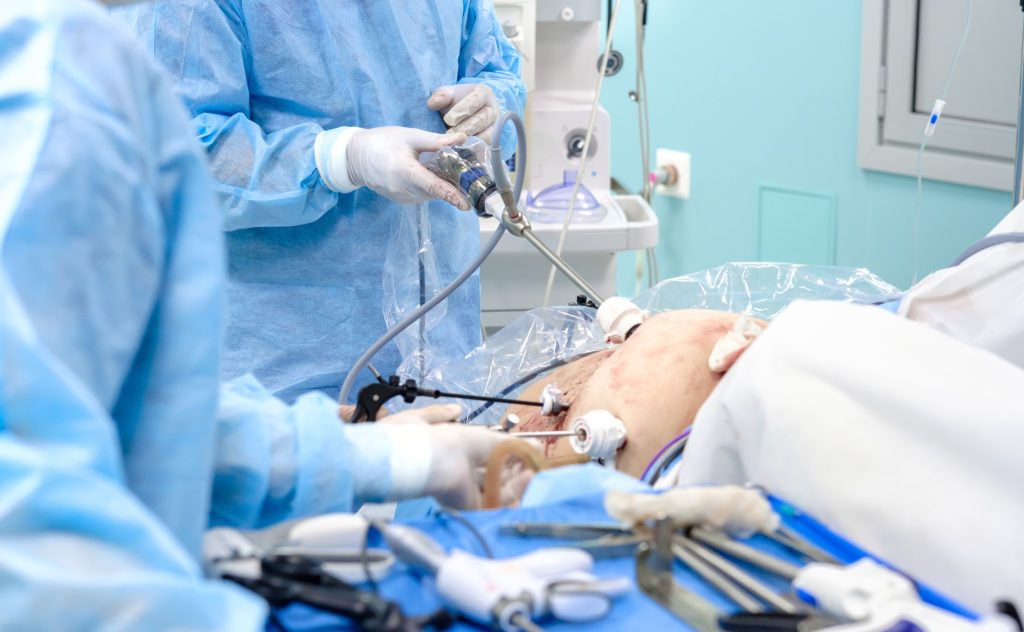Laparoscopic Colorectal Surgery

Laparoscopic Colorectal Surgery is a minimally invasive surgical approach used to treat various conditions affecting the colon and rectum. This technique involves using a laparoscope and specialized instruments to perform the surgery through small incisions, reducing recovery time, pain, and scarring compared to traditional open surgery.
Indications for Laparoscopic Colorectal Surgery
This procedure is commonly performed for:
Benign Conditions:
- Diverticulitis.
- Crohn’s disease and ulcerative colitis.
- Rectal prolapse.
- Severe constipation due to colonic inertia.
Malignant Conditions:
- Colon and rectal cancer (early-stage and some advanced cases).
Other Conditions:
- Intestinal obstructions.
- Removal of polyps that cannot be removed endoscopically.
- Ischemic colitis (lack of blood flow to the colon).
Procedure Steps
Preparation:
- Preoperative Evaluation:
- Physical examination, imaging studies (CT, MRI, or colonoscopy), and lab tests are conducted.
- Bowel Preparation:
- Patients typically undergo bowel cleansing with a laxative or enema the day before surgery.
- Dietary Restrictions:
- Fasting is required for 6–8 hours before the procedure.
- Medications:
- Certain medications, especially anticoagulants, may be adjusted or stopped temporarily.
- Preoperative Evaluation:
Anesthesia:
- General anesthesia is administered to ensure the patient remains unconscious and pain-free during the procedure.
Incision and Entry:
- Small incisions (typically 3–5) are made in the abdomen.
- A trocar is inserted into one incision, and carbon dioxide gas is used to inflate the abdominal cavity for better visualization.
- A laparoscope (a thin tube with a camera) is inserted through the trocar.
Surgical Procedure:
- Specialized instruments are introduced through the other incisions to perform the surgery.
- For Cancer:
- The affected segment of the colon or rectum, along with nearby lymph nodes, is removed.
- For Benign Conditions:
- Diseased or damaged segments of the colon are removed or repaired.
- The healthy ends of the colon are reconnected (anastomosis), or a temporary/permanent stoma may be created if necessary.
Completion:
- Instruments and the laparoscope are removed.
- Carbon dioxide gas is released, and incisions are closed with sutures or adhesive strips.
Duration:
- The procedure typically takes 2–4 hours, depending on the complexity.
Post-Procedure Care
Recovery:
- Patients are monitored in the recovery room for several hours after surgery.
- Hospital stays are typically 3–5 days, depending on the procedure and recovery progress.
- Mild abdominal pain, bloating, and fatigue are common but temporary.
Diet:
- Clear liquids are introduced post-surgery, gradually transitioning to a regular diet as tolerated.
Activity:
- Light activities can resume within a week, but strenuous activities should be avoided for 4–6 weeks.
Follow-Up:
- Scheduled to monitor healing, review pathology results (if applicable), and plan further treatment if needed.
Dr. Masfique Ahmed Bhuiyan
- MBBS (DMC), BCS (Health)
- FCPS (Surgery), F.A.C.S, F.M.A.S
- Assistant Professor
- Surgical Gastroenterology
- Laparoscopic and Intervention Endoscopic Surgeon
- Dhaka Medical College Hospital, Dhaka.
Opening Hours
- Eden Multi-Care Hospital (Pvt) Ltd
- Visiting hours: Saturday, Monday and Tuesday from 3 pm to 8 pm.

